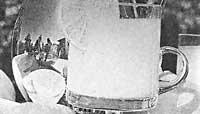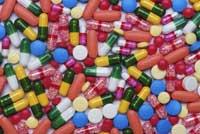The myth of water, is it good to drink a lot of water?
2002/09/08 Galarraga Aiestaran, Ana - Elhuyar Zientzia
Knowing that almost three quarters of the human body are water, the importance of water is evident. In addition to being the main component, the body plays the necessary functions for life, such as the transport of food and gases, the elimination of waste (being a component of urine and feces), the regulation of body temperature, the sliding of the joints between the bones, the softness of the skin and the strength of the tissues...

On the other hand, the body loses a lot of water, especially in the urine. In fact, every day more than one liter of urine is lost, but at the same time waste that is generated in the activity of metabolism is eliminated. Among these residues, urea is the most important and, being a waste provided by proteins, the more proteins they ingest, the more water will be necessary for the disposal of these residues. On the other hand, there is a loss of 0.4 liters of water by excretion and breathing.
Another path of water loss is the skin, which although sometimes unnoticed, produces between 0.5 and 0.7 liters of sweat a day. Sweat, as in urine, goes toxins and other substances, but most is water, of course. Obviously, in warm and humid weather conditions, sweating is much more abundant, as sweating is the main body cooling system.
Thirst and rule ‘8 x 8’
To prevent this loss of water, the body has a special alarm mechanism: thirst. When the body has little water, the concentration of salts in the blood increases. This excites some receptors and sends a message to the brain. There comes the feeling of thirst and feels the need to drink. In addition, a hormone is produced that controls the amount of water absorbed in the kidneys in the brain. If there is a shortage of water, more hormone is produced and less water is lost with urine. On the other hand, there are other stimuli that stimulate thirst, as are some psychological factors and have dry mouth.

Thirst forces us to drink before we dehydrate. But when the need is not possible, symptoms of dehydration appear: the throat and skin dries, the volume of urine is reduced, the capacity of the brain is limited... If dehydration is severe, the body is greatly weakened and the heart cannot do its job. In addition, it should be noted that the most frequent causes of dehydration (diarrhea and vomiting) also cause the loss of sodium and potassium. Therefore, in addition to water, mineral salts must be taken.
Knowing all this, several experts recommend ensuring that water needs are covered without waiting to feel thirsty. For this, it is best to drink two liters of water a day, which is what the body needs. They seem to have forgotten that other liquids are normally consumed and that food (especially fruits and vegetables) also has water. In addition, as a result of the activity of metabolism, the body produces about 350 ml of water a day.
However, there is widespread belief that it is necessary to drink at least two liters of water a day. Moreover, in the US, where many experts recommend the ‘8 x 8’ standard (eight glasses of eight cups a day), and there are many people who meet very well and rigorously.
Maybe it's not so good to drink so much water
So far few have doubted that following the ‘8 x 8’ standard is healthy. However, physiologist Heiz Valtin, of the Darmouth Institute of Medicine, has wondered if the norm has a scientific basis and, after conducting research on it, has just published its results.
To begin with, Valtin has not found any scientific work that demonstrates the veracity of the standard ‘8 x 8’. On the contrary, numerous articles have been published on fluid intake, according to which, in no case, it is necessary to ingest so much water.

On the one hand, Valtin does not deny that taking this amount of water is very good for curing or preventing diseases such as kidney stones, even in special situations, when it is very hot, when you exercise intensely or on long plane trips. But, on the other hand, most of those who follow the ‘8 x 8’ standard are healthy and lead a sedentary life. And he believes they drink more water than they need, sometimes even enough to hurt them.
This researcher warns that it is enough that one of the kidneys does not work properly for aquatic poisoning to occur. This causes dizziness and can even lead to death. Despite not being heard, it is not so rare in high-level athletes, ecstasy youth and common patients.
Without reaching this point, there are considerable damage. For example, drinking water for many years can lead to the accumulation of contaminants in water. Also, if you drink bottled water, it is expensive and having to go to the bathroom will often not be very comfortable.
However, the most compelling reason to question the ‘8 x 8’ rule is that millions of healthy people in the world drink much less water a day and so it has always been.
Published in 7K.

Gai honi buruzko eduki gehiago
Elhuyarrek garatutako teknologia





